Every webmaster wants to rank on the search engine result page (SERP). That’s where you’ll get traffic organically. People just never go to the second page of the SERP, because they don’t need to. In order to rank their page, webmasters usually go for keywords with high search volume because it indicates there is huge traffic. In other words, there are people searching for it.
Ever have a great blog post title and idea but when you’ve done your keyword research, the keyword shows a low search volume? And you ended up forgoing that blog post?
Well, today, I will be sharing with you the situations when you can actually ignore a keyword’s search volume. For your reference, below is a list of areas that will be discussed.
- What is Keyword Research and Why We Do Keyword Research
- What is Keyword Search Volume and How to Get Them
- When You Should Ignore A Keyword’s Search Volume
What is Keyword Research and Why We Do It?
Keyword Research is one of the very first steps of an SEO campaign. It is the process of looking for alternative keywords that people enter into the search engines. We do keyword research also to find out how popular they are.
Keyword research gives us an idea of what to expect; traffic, sales, ranking. They’re usually done using tools where they provide data such as search volume, cost per click, etc.
What Is Search Volume and How to Get Them?
The search volume data tells us how popular the search term is. It is important to pick the “right” keyword. The higher the search volume, the higher the number of potential traffic to your website.
But a high keyword search volume isn’t always good, we will go further into details about this later on.
As mentioned above, many keyword research tool provides users with data. My team and I have actually written a few blog posts using keyword research tools. You may read about them by clicking on the titles below:
- How To Use Keyword Intelligence To Level Up Your SEO Strategy
- 15 Best Free Keyword Research Tools
- The Best of BiQ SEO Suite When Doing Keyword Research
The keyword research tools mentioned in those blog posts provide data such as search volume, trends of the keyword, cost per click as well as competition.
The one I’d highly recommend certainly comes from BiQ’s Keyword Intelligence module.
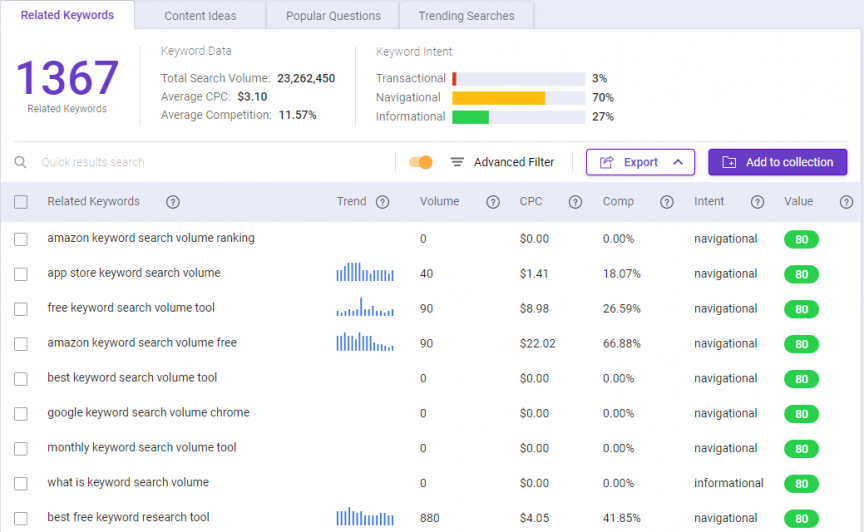
But let’s focus on a keyword’s search volume today and when you should actually ignore them.
When Should You Ignore A Keyword’s Search Volume?
1. When You Are Using a Long-Tail Keyword
You should ignore a keyword’s search volume when you are using a long-tail keyword. A long-tail keyword is a search term that consists of 3 or more words. Content writers use them as they’re much easier to rank for and they convert better.
Also, they’re used to pinpoint search intent as well as avoid tough competition on the SERP. The opportunity cost would be the high search volume.
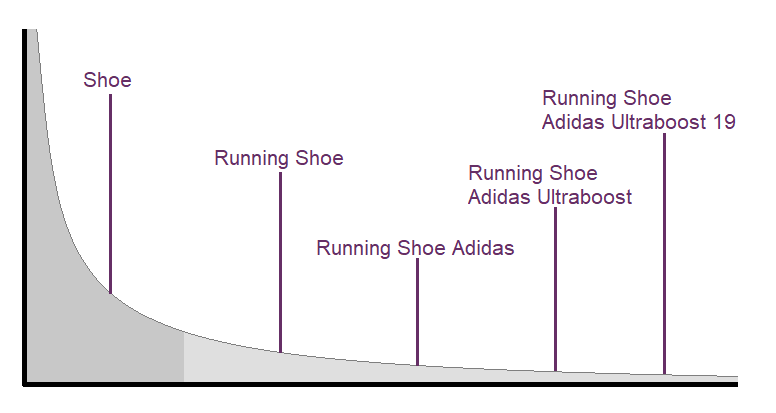
Some characteristics of long-tail keywords are low search volume, low competition, high focus, and high conversion rate.
If you want to convert better, you will need to target long-tail keywords as they have lesser competition and are able to pinpoint the users’ search intent.
Long-tail keywords are specific, which means their search volume will generally be lower.
ii. Competition
Similarly, you need to ignore volume if you think competition is high. Everybody wants to rank for high-volume keywords. Who wouldn’t want a huge amount of traffic, conversions, and sales from organic search?
But not every business can rank for high-volume keywords. Those super popular keywords are way more competitive, which means many more sites are competing for the limited number of spots on the first page of the SERP.
So what can you do if you’re a smaller business with a less authoritative site? Higher volume, more work to achieve rankings.
You can obtain long-tail keywords in many ways. Here’s one way: Using Google Autocomplete.

And then there’s another fast and efficient way: Using BiQ’s Keyword Intelligence
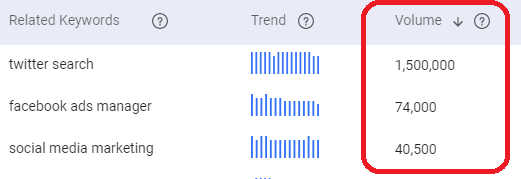
2. When You Are In A Niche Market
When you are in a niche market, a keyword’s search volume will definitely be lower because logically, there are fewer people searching for that term.
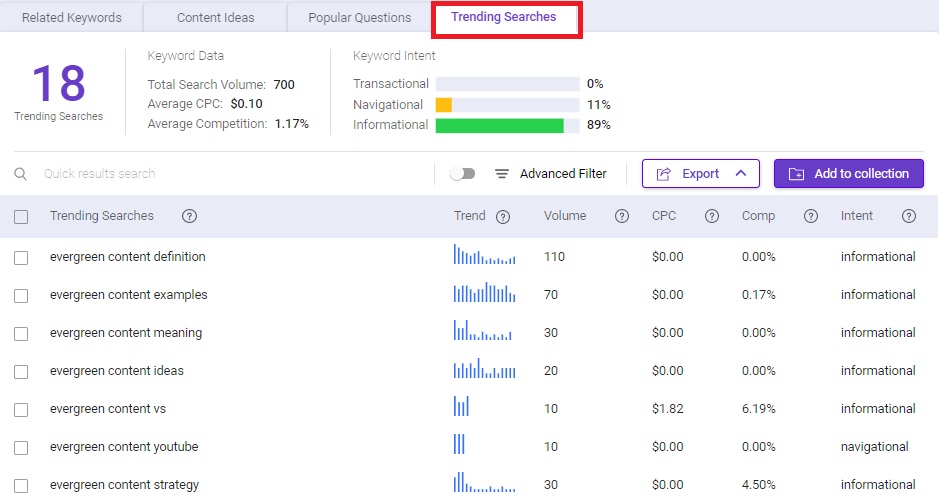
What you can do when targeting keywords with no or low search volume is using tools like Keyword Intelligence. Their “Trending Search” tab tells shows you the latest keywords surrounding your main keyword.
This helps you discover what trending searches people are actually searching for online. Now, this is your chance to give them what they are looking for.
3. When It is A Seasonal Keyword
Sometimes, when you come across a keyword that has a low search volume, you need to check Google Trends. Perhaps, there may be low volume now but high volume for a specific period of time.
Some keywords’ search volume surges only for a particular period of time. For instance, when it’s close to Christmas, the search volume for “Gingerbread” increases.
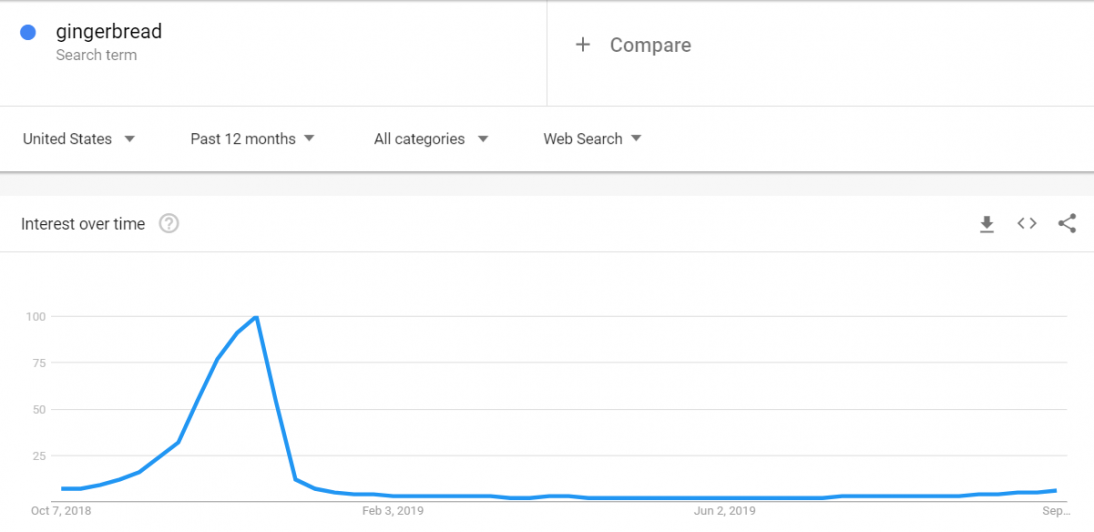
As you can see from the image above, the search volume surges during the last quarter period of the year.
Why? Because Gingerbread cookies are made during that period. Chances are people are looking for recipes to make it. Or, they’re looking to buy them.
Hence, if you’re writing about something that is seasonal, you should totally ignore the search volume. Or… the current search volume. When the season comes, traffic and search volume will surely come!
4. When They Are Irrelevant
Keyword relevancy is more important than search volume. A high search volume for a keyword does not indicate that the keyword must be used. The tools only generate keywords that are related to the primary keyword.
Your task is to choose only those that are relevant to your content. After all, it is read by the users and not the tool. Irrelevant keywords will make your readers confused and it isn’t any good for the user experience.
5. Page Rarely Rank For A Single Keyword Alone
There are many ways to ask the same question. For instance, you want to learn how to increase website traffic. Possible searches would be something like:
- How to increase website traffic?
- Ways to increase website traffic
- Steps to increase website traffic
Hence, webmasters typically include LSI keywords in their content to improve their chances of ranking. There are a few benefits to using LSI keywords.
Firstly, it prevents you from being penalized by the search engine itself. Using the same keywords over and over again in your content will make the search engine think that you’re stuffing keywords, which tells Google you’re just trying to rank instead of providing value to the users.
Next, it does not bore the users as well. It makes your content nice for the readers to read. It will increase their time-on-page and satisfaction, which means they will visit your page more often in the future.
Besides using LSI keywords, some webmasters, do keyword research and result page analysis to see which keyword would reap the most benefit. Now, take a look at the SERP below.
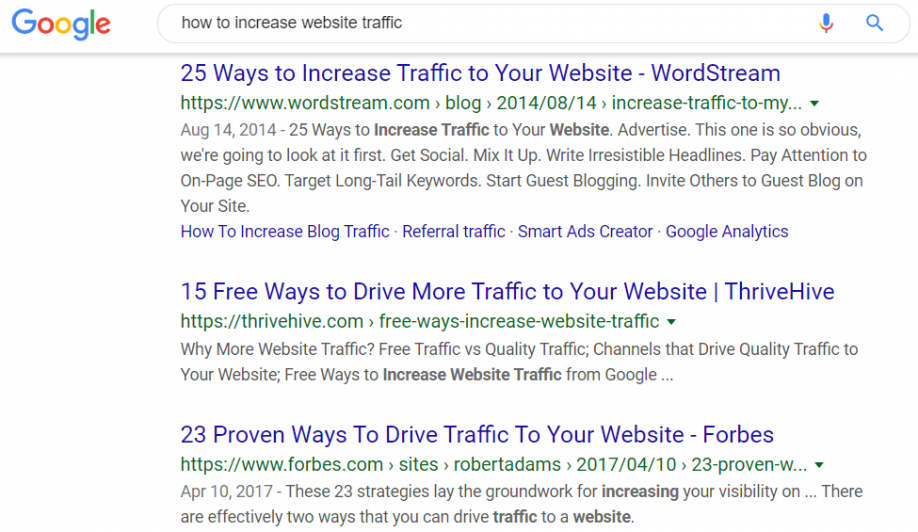
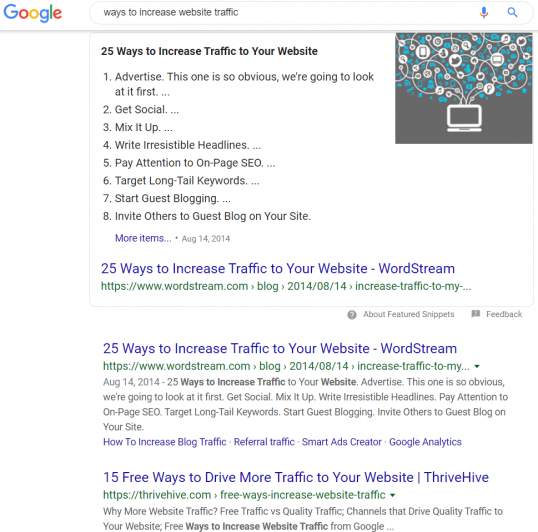
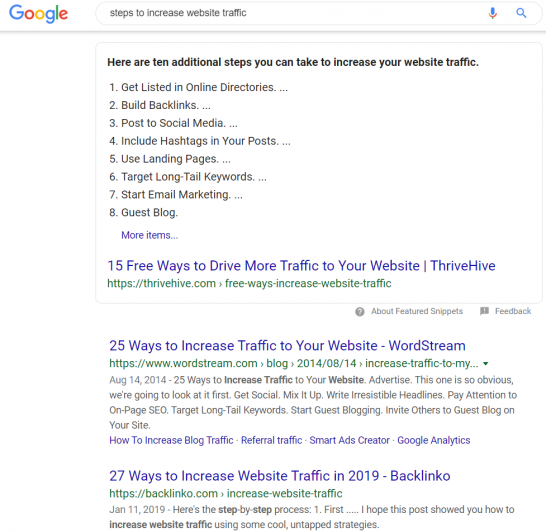
Now, if you noticed, WordStream ranks first for “How to Increase Website Traffic” and ranks in Position 0 for “Ways to Increase Website Traffic”. Those are two of the searches people would likely key in when they are looking to increase their website traffic.
Another search possibility would be “steps to increase website traffic”. As you can see, ThriveHive ranks in Position 0 for this query.
6. When you are focusing on voice search
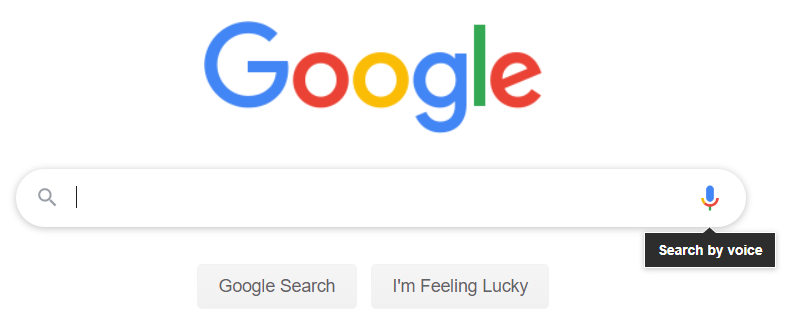
Last but not least, it is when you’re optimizing for voice search. Many do not realize this yet but, voice search will be dominating SEO in the coming years. It is only getting more popular as days pass.
We are making searches using voice commands, be it, television, our cars, and mobile phones themselves.
Voice Search is very different as compared to a regular search on the search engine, in terms of how we interact with them.
Regular search: jump higher exercises
Voice search: What exercises can help me jump higher?
See the difference?
If you’re optimizing for voice search, you should ignore your keyword search volume. There may be low to no search volume because they’re specific, at least for the time being. But guess who will rank when voice search becomes the norm? You!
Conclusion
Remember, the broader the keyword (or the higher the search volume), the tougher the competition. Hence, it may be more profitable to target long-tail keywords with less search volume as they have lower competition and are more targeted as well. If you go for broad keywords, you may not even rank
Even if it does have thousands of searches each month, your site may not get even half of them. The top 3 pages on the SERP capture the most traffic share and they are usually pages that are authoritative.
Hence, it’s better to focus on niche, long-tail keywords. Every single keyword can potentially bring in revenue regardless of search volume. It all depends on how you convey your message, how well you write for your readers, and how well you promote your content.




